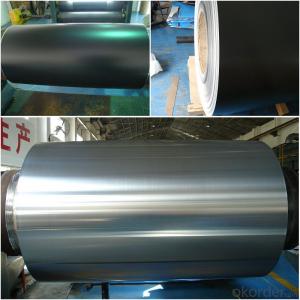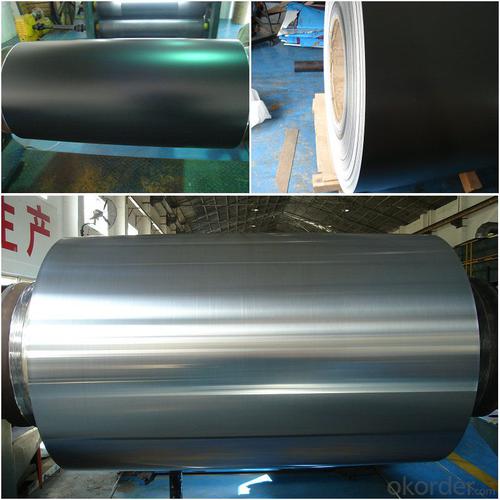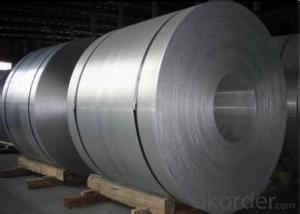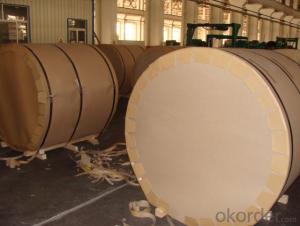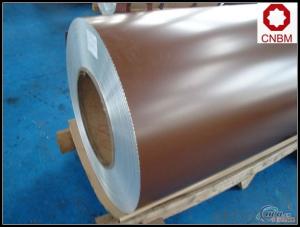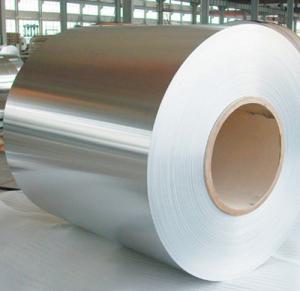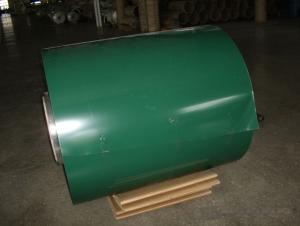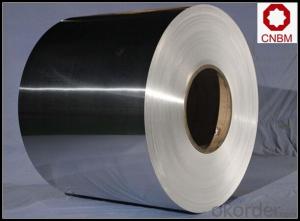Menards Aluminum Coil - Black Color Coated Mill Finish Aluminum Rolls
- Loading Port:
- China Main Port
- Payment Terms:
- TT OR LC
- Min Order Qty:
- -
- Supply Capability:
- -
OKorder Service Pledge
OKorder Financial Service
You Might Also Like
Color coated aluminum coil is a material with excellent acid-resistance and alkali-resistance. The coating layeris even with bright color to last for a very long time. It is a greendecoration material with the characters of environment protection,flame-resistance, and groovy colors. In nowadays, the color coatedaluminum coil has become the popular material for top grade decoration. With our advance professional aluminum coated technique, wecan custom various aluminum coils ,like coated aluminum coil , Color coatedaluminum coil , embossed aluminum sheet with the color and size which youdemands.
1)Process: pre-treatment, continuous painting and baking for times .
2)Material: high quality material, aluminum sheets from South West AluminumIndustry Company in China, pre-treatment material from Henkel & Chemtellfrom Germany, more than 70% of PVDF coating from PPG Corp., the USA andpolyester from Sweden Becker Industrial Coating Co., Ltd.
3) Ourproducts can keep excellent quality and stability.
4)Thickness: 0.06 - 1.0mm; width: 20 - 1,590mm
Applications:
The aluminum coils are widely used in ACP/curtainpanel/honey comb panel/shutter/roofing and most of the decoration areas. Withthe superior quality and advanced management, our products had been export toEuro/North America /East Asia and many other areas and countries.
PEAluminum Coating Coils for ACP
Featuresof PE Aluminum Sheet:
1.Adopting precision rolling coating technology, our PVDF and PE coated coil canensure excellent adhesive without coating omission.
2. For thePE coated aluminum coil we produced, there are various colors for your choice.
3. Usinginfrared heating technology to protect environment from pollution.
4. Ourcoated aluminum coil has four-roller coating line, uniform coating thicknessand good features.
RawMaterial of the PE Aluminum Coating Coils:
1. Aluminum Coil: high strength aluminum withalloy of AA1100 (aluminum alloy is available with AA3003, AA3005, AA5005according to customer)
2. Surface Paint: PE, PVDF and specialpaints.
Specification of PE Aluminum Coating Coil
Width: 20mm~1590mm
Thickness: 0.06mm~1.0mm
External Diameter: ≤ 1500mm
Internal Diameter: 405mm, 505mm, 150mm, 75mm
Coil weight: ≤ 4000kg
PE coated aluminum coil is processed throughthe technics of roller coating and baking with precise polyester paints. Itscolor is glossy and with variety of colors enabling you to choose easily.Chromatic aberration is small, impact resistance is strong and easy to beprocessed, and all its performance has reached or surpassed the nationalcriteria. The products are widely used in indoor and door decoration, ceilings,room surface tiles, corrugated boards, wallpanels, advertisement boards, counters, home appliances, decoration in and outof autos and boats.
Performance of thecoating
Aluminum Thickness | Coating Thickness | MEK | T- Bend | Impact | Adhesion | Pencil Hardness | Boiling Water Proof |
0.3-1.5mm | ≥18μm | ≥100 Times | ≤2T | 50 kg•cm | 0 Grade | ≥HB | no change within 2 hours |
0.2-0.28mm | ≥18μm | ≥100 Times | ≤2T | 30kg•cm | 0 Grade | ≥HB | no change within 2 hours |
0.15-0.18mm | ≥18μm | ≥100 Times | ≤3T | 20 kg•cm | 0 Grade | ≥HB | no change within 2 hours |
0.08-0.12mm | ≥16μm | ≥80 Times | ≤4T | 10 kg•cm | ≤1 Grade | ≥HB | no change within 1 hour |
0.022-0.06mm | ≥12μm | ≥50 Times | - | - | ≤1Grade | ≥HB | no change within1 hour |
Color of Card
PE (polyester)
PE
Color Match
For custom' color requests, we can deal as following:
1. Supply a physical sample of custom color. A color sample on metal ispreferred. If other, it is also acceptable. But the color matching rate may benot good as color on metal.
2. New color sample is usually offered by our paint supplier in 5-7 days,special color should be in 7-10 days.
3. Upon receipt of color sample, please approve in writing as soon as possible.Once you approved, we will arrange purchasing and production.
Note: Color difference maybe occurred in different production batch, so it issuggested all panels are placed in one order for same project. And keep samedirection as arrow on protective film when installing to avoid any colordifference by vision
- Q: hello I'm building a TIG welder and have found the output from my stick welders to be not so good for aluminum(60 Hz on one). I've heard that high frequency AC is the way to do AL but am not sure what constitutes high. I do have a nice miller gas driven welder also that is maybe triple the frequency of my line driven one but still had issues with it. does anyone know of an actual # ? I may be able to build an inverting PWM supply eventually to do this but am not sure what I would need it to do. does anyone have any data that might help? any data/tips about aluminum would be appreciated, thanks in advance. FYI I do understand why AC works so much better on AL, what with the oxides that are always present.
- Best not to play around with jury-rigged equipment if you don't have to. The best option would be to simply buy a purpose-made Inverter power source for TIG. The high frequency is secondary to the main AC power, which is by default, 60 hz. In other words, the high frequency is simply added on top of the main AC current. A lot of inverter power supplies for TIG allow you to alter the MAIN power AC frequency to above or below 60 hz. This can be helpful as increasing the frequency produces a somewhat narrower arc. The high frequency is little more than highly amplified radio noise that is injected into the main power signal. It consists of a broad range of frequencies, usually in the range of kilohertz to megahertz. Beneficial features to look for in an inverter include high-frequency generator, square wave, AC wave balance, AC frequency adjustment, high frequency intensity adjustment, and a foot control. Pre-flow and post-flow controls can also be convenient if you expect to be doing mass production jobs. I consider other features, including pulsed TIG, to be mostly a waste of time and money. With respect to the previous poster, the high frequency DOES help with the cleaning action for welding aluminum.
- Q: Can aluminum coils be welded or joined together?
- Yes, aluminum coils can be welded or joined together using various methods such as TIG (Tungsten Inert Gas) welding, MIG (Metal Inert Gas) welding, or using specialized aluminum welding techniques.
- Q: Can aluminum coils be used in the production of aluminum gutters?
- Yes, aluminum coils can be used in the production of aluminum gutters. Aluminum coils are commonly used in the manufacturing process of aluminum gutters to form the desired shape and dimensions of the gutter system.
- Q: This question asks for methods to check the quality of aluminum coils.
- <p>To inspect aluminum coils for quality, follow these steps: Visually inspect for any surface defects like scratches, dents, or discoloration. Measure the thickness and width to ensure they meet specifications. Check the hardness and tensile strength using appropriate testing equipment. Examine the coil's flatness and straightness to avoid issues in further processing. Assess the surface roughness and cleanliness, as these can affect the coil's performance. Conduct a chemical composition analysis to confirm the alloy type and purity. Perform a magnetic particle inspection or ultrasonic testing to detect any internal defects. Finally, ensure the coil meets the required mechanical properties and specifications as per industry standards.</p>
- Q: How do aluminum coils perform in applications where high strength is required?
- Aluminum coils are renowned for their outstanding performance in situations that demand strong materials. Despite being lightweight, aluminum possesses impressive strength characteristics, making it an ideal option for numerous industries. The alloy composition of aluminum coils is a key contributor to their exceptional strength. By incorporating elements like copper, magnesium, and zinc, aluminum alloys can be customized to enhance their strength. These alloying elements create intermetallic compounds that significantly boost the aluminum's strength without compromising its weight. Moreover, various manufacturing processes, such as hot or cold rolling, further enhance the strength of aluminum coils. These processes align the metal's grain structure, resulting in increased strength and resistance to deformation. As a result, aluminum coils can endure high levels of stress, making them suitable for applications that prioritize durability and reliability. Furthermore, aluminum coils display exceptional resistance to corrosion, which further enhances their performance in high-strength applications. Aluminum naturally forms a protective oxide layer on its surface, safeguarding it against corrosion and ensuring long-lasting durability. This corrosion resistance is particularly valuable in environments where high-strength materials are exposed to moisture, chemicals, or harsh weather conditions. Additionally, aluminum coils possess excellent thermal conductivity, enabling efficient heat dissipation in applications like heat exchangers or radiators. This property is crucial in industries that require high-strength materials to withstand elevated temperatures, as it helps prevent overheating and subsequent material degradation. In summary, aluminum coils are highly effective in high-strength applications due to their alloy composition, manufacturing processes, corrosion resistance, and thermal conductivity. Their combination of strength, lightweight design, and durability makes them a preferred choice in industries ranging from automotive and aerospace to construction and electrical.
- Q: What can I get easily at Home Depot that will successfully bond rubber to aluminum?? I have tried several things with no success! Surely, there must be some sort of construction adhesive to do the job.Thanks!
- have you tried a strong adhesive such as crazy glue? i'm sure that'll bond to anything but try sand down the rubber before you put on the glue so it holds, hope i've helped?
- Q: Can aluminum coils be used for signage purposes?
- Yes, aluminum coils can be used for signage purposes. Aluminum is a durable and lightweight material that can be easily shaped and formed into various sign designs. Additionally, aluminum is weather-resistant and corrosion-resistant, making it suitable for both indoor and outdoor signage applications.
- Q: Is it possible to utilize a press machine to bend aluminum coils?
- <p>Yes, you can use a press to bend aluminum coils. Presses are versatile machines capable of bending various materials, including aluminum. However, it's crucial to select the appropriate press type and size for the specific coil dimensions and desired bend. Additionally, ensure the press has the necessary tonnage to handle the bending force required for aluminum. Using the right dies and lubrication can also improve the bending process and prevent damage to the coils. Always follow safety guidelines and consult with equipment specifications to ensure the press is suitable for bending aluminum.</p>
- Q: Im doing an assignment for science and i need to know the nuclear charge of Aluminium?and also is there a difference between Aluminium and Aluminum or can it just be spelt differently?
- Aluminium is the European spelling Aluminum is the American spelling...just like colour and color. Aluminium ion usually has a 3+ charge
- Q: Can aluminum coils be used in the production of aircraft fuel tanks?
- Yes, aluminum coils can be used in the production of aircraft fuel tanks. Aluminum is a lightweight and durable material that is commonly used in the aerospace industry due to its high strength-to-weight ratio. Its corrosion-resistant properties also make it an ideal choice for fuel tanks, as it can withstand the harsh conditions and chemicals found in aviation fuel. The use of aluminum coils allows for efficient manufacturing processes, as they can be easily formed and welded into the desired tank shape. Additionally, aluminum has excellent thermal conductivity, which helps dissipate heat generated during flight and prevents the fuel from overheating. Overall, aluminum coils are a suitable and widely-used material in the production of aircraft fuel tanks.
Send your message to us
Menards Aluminum Coil - Black Color Coated Mill Finish Aluminum Rolls
- Loading Port:
- China Main Port
- Payment Terms:
- TT OR LC
- Min Order Qty:
- -
- Supply Capability:
- -
OKorder Service Pledge
OKorder Financial Service
Similar products
Hot products
Hot Searches
Related keywords
